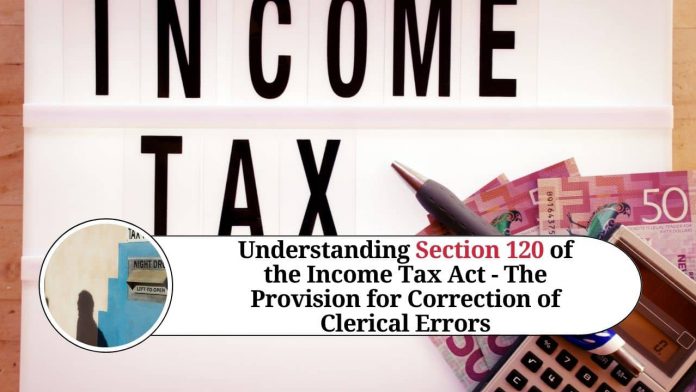The Indian Income Tax Act, 1961 is a comprehensive legislation that governs the taxation of income in India. The Act contains various provisions that deal with the assessment, computation, and payment of income tax. One such provision is Section 120 of the Income Tax Act, which deals with the correction of clerical errors.
What is Section 120 of the Income Tax Act?
Section 120 of the Income Tax Act empowers the income tax authorities to correct any mistake or error apparent on the face of the record. This provision enables the authorities to rectify any clerical error that may have occurred while processing the income tax return.
According to Section 120, the income tax authorities can rectify any mistake or error in the following scenarios:
- If the mistake is apparent on the face of the record.
- If the mistake is discovered by the authorities during the course of any proceedings.
- If the taxpayer brings the mistake to the notice of the authorities.
The provision is applicable to all types of clerical errors, including errors in the name, address, PAN, TAN, and other details mentioned in the income tax return.
How to apply for correction under Section 120?
If a taxpayer discovers any mistake or error in their income tax return, they can apply for correction under Section 120 of the Income Tax Act. The application for correction can be made in the following ways:
- Online application: The taxpayer can apply for correction online through the income tax e-filing portal.
- Manual application: The taxpayer can submit a written application to the concerned income tax authority.
The application for correction should contain the details of the mistake or error and the necessary corrections to be made. The application should be supported by relevant documents, if any.
Once the application is received, the income tax authorities will verify the details and make the necessary corrections. The authorities will then issue a revised intimation to the taxpayer.
Limitations of Section 120
It is important to note that Section 120 has certain limitations. The provision can only be used to correct clerical errors and not substantive errors. For example, if there is a dispute regarding the tax liability of a taxpayer, Section 120 cannot be used to resolve the dispute.
Further, the provision can only be used to correct mistakes or errors that are apparent on the face of the record. If the mistake is not apparent on the face of the record, the taxpayer may have to approach the appropriate appellate authority.
Conclusion
Section 120 of the Income Tax Act is a useful provision that enables taxpayers to correct clerical errors in their income tax returns. By allowing for the rectification of mistakes and errors, the provision ensures that taxpayers are not penalized for unintentional errors in their tax returns. However, it is important for taxpayers to understand the limitations of the provision and approach the appropriate authority in case of any disputes or substantive errors.
Other Related Blogs: Section 144B Income Tax Act
Frequently Asked Questions (FAQs)
Q.1 What is Section 120 of the Income Tax Act?
Section 120 of the Income Tax Act is a provision that empowers the income tax authorities to correct any mistake or error apparent on the face of the record.
Q.2 What kind of errors can be corrected under Section 120?
Section 120 can be used to correct any clerical errors, such as errors in the name, address, PAN, TAN, and other details mentioned in the income tax return.
Q.3 How can I apply for correction under Section 120?
You can apply for correction under Section 120 by submitting an application online through the income tax e-filing portal or by submitting a written application to the concerned income tax authority.
Q.4 What documents do I need to submit with my application for correction?
You should submit all relevant documents supporting the correction you are requesting. For example, if you are requesting a correction to your name, you should submit a copy of your ID proof.
Q.5 Can Section 120 be used to correct substantive errors?
No, Section 120 can only be used to correct clerical errors that are apparent on the face of the record. If there is a dispute regarding the tax liability of a taxpayer, Section 120 cannot be used to resolve the dispute.
Q.6 Is there a time limit for applying for correction under Section 120?
There is no time limit specified for applying for correction under Section 120. However, it is advisable to apply for correction as soon as you discover the error to avoid any penal consequences.
Q.7 Can the income tax authorities reject my application for correction?
Yes, the income tax authorities can reject your application if they do not consider the error to be a clerical error or if the error is not apparent on the face of the record.
Q.8 Can I appeal against the decision of the income tax authorities regarding my application for correction?
Yes, you can appeal against the decision of the income tax authorities by approaching the appropriate appellate authority.
Q.9 Will I receive a revised intimation once the correction is made?
Yes, once the correction is made, the income tax authorities will issue a revised intimation to you. This revised intimation will reflect the corrected details.
Q.10 Is there any fee payable for applying for correction under Section 120?
No, there is no fee payable for applying for correction under Section 120.




















